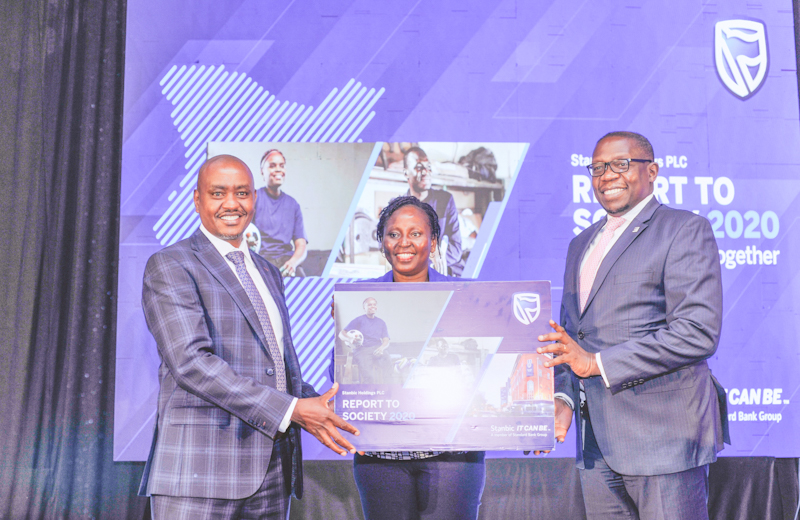Stanbic Bank says it has identified seven areas that can drive growth by generating employment, reducing inequalities and promoting development in a sustainable manner beyond its products and services.
The banks’ latest sustainability report gives focuses on Education, Job Creation & Enterprise Development, Financial Inclusion, Health, Infrastructure, Trade, and Investment, as well as Climate Change & Sustainable Financing.
“We selected these areas based on their relevance to our core business as a provider of financial products and services, and the priority needs of people, businesses and economies,” part of the report says.
“Our thinking has been informed by the priority issues and targets contained in the United National Sustainable Development Goals, the African Union’s Agenda 2063, as well as the various national development plans and policies of Kenya and South Sudan. This includes the Nationally Determined Contributions to lowering carbon emissions in line with the Paris Agreement.”
Stanbic Bank’s 2020 Report to Society is its annual integrated sustainability report highlighting its social, economic and environmental impact on the country.
The report also demonstrates the lender’s objective to create shared value by supporting the core pillars of society while also realizing targeted financial returns.
The Report to Society highlights our contribution to driving the country’s economic growth in seven key areas: Education, Job Creation & Enterprise Development, Financial Inclusion, Health, Infrastructure, Trade, and Investment as well as Climate Change & Sustainable Financing. pic.twitter.com/REOO42p83r
— Stanbic Bank Kenya (@StanbicKE) December 6, 2021
Highlighting the key achievements in the report, the Bank restructured loans to the value of Ksh 40 billion, extended repayment holidays to 7,203 clients and lowered interest rates saving customers Ksh 665million.
On Infrastructure, Trade and Investment, the Bank issued Ksh 1 billion as guarantees in support of transportation infrastructure development. At the same time, on Trade and Investment, the Bank provided unsecured short-term financing for trade to Small and Medium Enterprises (SMEs) backed by Ksh 1 billion in secured guarantees.
The report discloses that the bank strengthened its ability to contribute to its 7 focus areas, enhanced the capacity of the Stanbic Kenya Foundation and forged a closer working relationship with key government departments.
The Foundation has achieved significant milestones along the way and impacted Education, Job Creation and Enterprise Development through the launch of the Accelerate Program.
The Accelerate Program seeks to position Kenyan businesses for success by providing individuals and enterprises with digital literacy and career development training, as well as funding and access to job markets.
Through the program, over 21,000 SMEs and individuals have benefited can position their businesses better in a digital world. This was achieved through a Public-Private Partnership between the Stanbic Kenya Foundation, the Ministry of Industrialization, Trade and Enterprise Development and Microsoft Kenya.
Through its Financial Fitness Academy (FFA), the Bank has supported individuals and SMEs to understand how to manage their wealth better.
The Bank partnered with Microsoft and established the e-learning platform for community training and up-skilling people who have lost jobs due to Covid-19.
“Our goal of establishing the Accelerate Program was to address a significant skills gap in the country by boosting entrepreneurship and the employability of citizens,” Stanbic Bank Kenya Head of Foundation, Pauline Mbayah, noted.
Under Health, the Foundation contributed over Kshs 147million in partnership with corporates to provide 192 oxygen therapy units to the Ministry of Health and 1,000 handwashing stations to vulnerable communities across the country at the pandemic’s peak. It also carried out over 3,000 cancer screenings for those with limited access to affordable healthcare.
Trade and Investment, helped facilitate the deepening of investment and trade flows between Kenya and other African countries and between Kenya and global markets. This earned them the recognition of Kenya’s Best Investment Bank by Euromoney Awards for Excellence 2020.
On Climate Change and Sustainable Financing, the Bank was the lead arranger for Ksh 5.7 billion Green Bond by Acorn Holdings in Kenya in 2019. This was East Africa’s first-ever green bond, and the proceeds are going towards environmentally-friendly student accommodation in Nairobi.
“As a bank, we made a pledge to catalyse Kenya’s socio-economic growth. We remain committed to this promise,” Stanbic bank Kenya chief executive Charles Mudiwa said.




